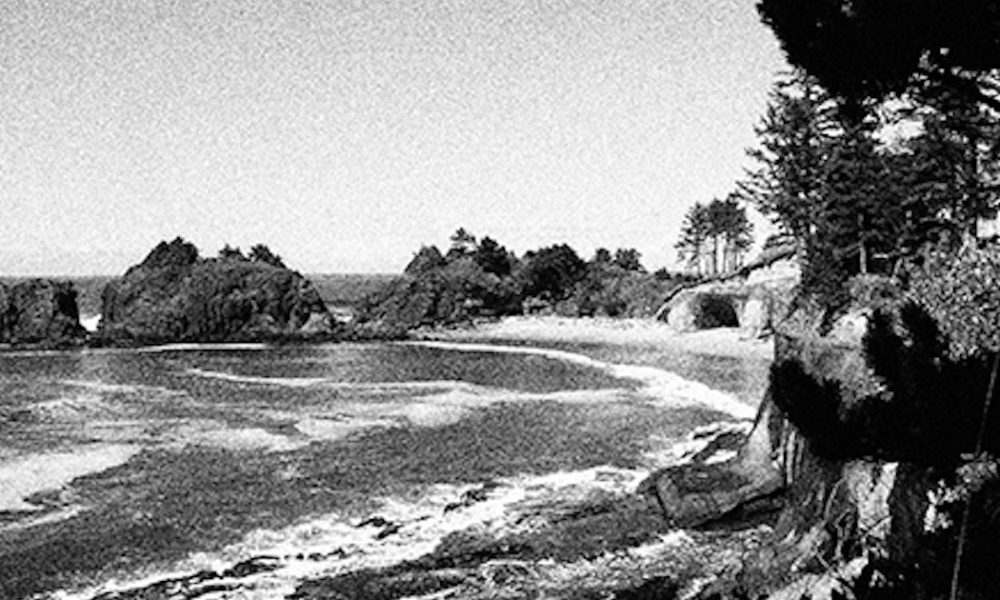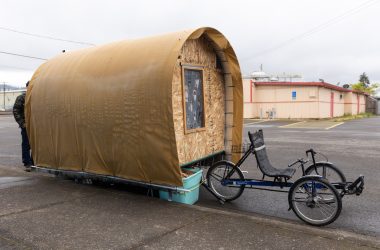 Photo Provided/Bryce Buchanan-ODOT
Photo Provided/Bryce Buchanan-ODOT
Around 10 p.m. on the night of Saturday, March 19, 1932 – just a few months before Prohibition was ended – four vehicles rolled furtively into the little Coast Range town of Toledo.
A big, important-looking sedan led the caravan, followed by two large trucks and finally a sleek Buick coupe. In the coupe, two men sat cradling machine guns.
The nine men in those vehicles weren’t tourists. They’d come to Toledo to get three of their business associates and bring them back home to Canada, with their luggage.
It wouldn’t be an easy rescue, though. Their friends weren’t staying in a Holiday Inn. They were locked away in cells at the Lincoln County Jail. And their ”luggage” was more than a couple of beige Samsonite bags; it consisted of roughly 400 cases of bonded Canadian whisky, rum, and brandy, along with several dozen 15-gallon cans of 190-proof straight alcohol – and it was locked securely away in the jailhouse evidence room.
The three men in the jail that night were the crew of the 36-foot Canadian motor yacht Sea Island, which had run onto the rocky reef in the mouth of Whale Cove while making a midnight liquor delivery there a few weeks before. They’d buried the booze on the beach and tried to beat it, but they’d crashed their car near Hebo, drawing police attention when the wreck was discovered to have switched plates; the word had been passed along, and the three Canadian mariners had been arrested as they stepped off the bus in Portland and brought back to Toledo to await trial on bootlegging charges.
Now their friends were there to bust them out of the joint in proper gangster style.
The party was delayed a bit when a Lincoln County Sheriff car rolled into town, passed them and pulled into the county garage. But, a few minutes later, the deputy pulled out again and was gone. Around 11 p.m., the coast was clear, and it was showtime.
The smaller of the two trucks pulled up near the jailhouse, and Portland resident S.U. Carrick lugged an oxyacetylene cutting torch into the building. In about 15 minutes he had the locks cut off of all the intervening doors, and the three once-and-future prisoners were at liberty.
There followed a lively debate, according to the testimony of the other prisoners. The three Canadian mariners felt that breaking out of jail was a bit much; they thought it would be better to stay and face the music. But the leader of the rescue party, international motorcycle racer and Portland resident Paul Remaley, assured them that they couldn’t be extradited for a mere jailbreak. The jailbirds weren’t too hard to convince. They didn’t really want to stick around.
Meanwhile, Carrick had already gotten busy cutting his way into the evidence locker, and once this was done the other nine men hastily started lugging boxes of booze out to the waiting trucks. All the while, the men in the Buick peered over the front sights of their machine guns into the darkness, watching and listening for any signs of trouble.
Luck was with them (more luck than they could probably imagine, actually), and a few minutes later the Canadians, reunited at last, were piling into their vehicles. The gunmen in the Buick, their job done, disappeared into the night; the others got their rigs started and pointed them north, toward home.
Meanwhile, unbeknownst to all, they had been ratted out. A vague, anonymous phone call had come in to Portland authorities warning that something was going to happen in Toledo that night. The warning had been passed on to the state police, and a couple of squad cars had been dispatched to check things out.
The state cops were about 20 minutes from Toledo when they passed the caravan rolling northward: one sedan and two large trucks. It wasn’t unheard of for legitimate trucking companies to be hauling stuff around at night, but it was unusual enough to be noticed as the cops – who still didn’t know anything had happened in Toledo – approached the town.
But when they got there, and learned what had happened, they figured it out right quick. They jumped back into their cars and raced out of town in pursuit.
The trucks had a long head start on them. But they had one huge advantage: The vehicles had passed each other in the dark of night, and the drivers of the caravan hadn’t been able to see any of the details of the two cars that had passed them as they drove out of Toledo. They had no idea that the heat was on. So they continued driving northward at normal speeds. Then they stopped the two trucks. The smaller truck, with the welding kit in it, needed gasoline; the cans of gas for the trip were in the larger truck. So the bootleggers got busy refueling.
They were still refueling when two carloads of Oregon State Police troopers rolled up on them, guns drawn.
The cops quickly learned that the sedan had gone on ahead. They were pretty sure that if they pulled up behind it in their cop cars, the driver would hit the gas hard and might actually get away; or a rolling gunfight might break out, and someone could get hurt or killed. So instead of risking that, several of the troopers who were in civilian dress hopped into the trucks and drove on into the night. They figured by the time the people in the sedan figured out that they weren’t who they thought they were, they’d be covering them with their service revolvers and the jig would be up.
The ruse worked. They soon caught up with the sedan, which had pulled over to wait for them, and by the time the people in the car realized what was going on, they were already looking into the barrels of .38s.
The Lincoln County jail facilities no longer being in suitable condition for guests, the bootleggers were brought to the Benton County jail in Corvallis instead.
In court, the Canadian gangsters and their local associates were affable and colorful. They promptly posted bond – Remaley used his one phone call to tell someone named Frank to grab $13,500 in cash and come to Corvallis to bail him out. Carrick, the one who had cut the locks off the jailhouse doors, cheerfully offered to fix the jail for them, free of charge; since he wasn’t going anywhere for awhile anyway, he might as well make himself useful, and he held a boilermaker-union card. He could, he added, make the Lincoln County Jail break-proof if they wished.
He went on to compliment Lincoln and Benton counties on their accommodations. ”If you want a real jail experience, go down to Louisiana, where they feed you molasses and cornmeal and sowbelly,” he said. ”I know; I’ve been there.”
The men were all convicted, of course, on various liquor and prison-break charges, both federal and state offenses. But by the time they’d served their relatively short state sentences, Prohibition had been repealed, and the federal charges were dropped.
Several sources add a few final details to this story. According to these, the jail-breakers had in fact started a fire that damaged the Toledo jail heavily, and in lieu of prison some of the Canadians were sent back to Toledo to help repair it. When Prohibition was repealed in April of 1933, they were set free, and they headed back to Canada with many handshakes and expressions of friendship. It’s a fun little detail, but I haven’t been able to confirm it in any of the newspaper accounts, so I’m not sure it’s true.
Even without that detail, though, it’s a remarkable tale – one of the most audacious jailbreaks in history, perpetrated by one of the most colorful gangs of rogues ever. And they probably would have gotten away with it if they’d done a better job keeping their mouths shut while preparing for it – or if they’d contented themselves with just breaking their friends out of jail and left the booze alone.
But it’s worth mentioning that the whole caper could easily have gone bad – very bad. If the state cops had arrived in Toledo just 20 minutes earlier, there’s a real possibility that a gangland-style firefight would have broken out with the two gunmen in the Buick coupe. If that had happened, people would have been killed – probably some or all of the cops, possibly several of the jail-breakers.
It’s interesting to contemplate how history might have changed if those cops had left Portland just a few minutes earlier.
(Sources: Allyn, Stan. Top Deck Twenty! Best West Coast Sea Stories!. Portland: Binford, 1989; Portland Morning Oregonian, 21 Mar–20 Jul 1932)
Finn J.D. John teaches at Oregon State University and writes about odd tidbits of Oregon history. For details, see http://finnjohn.com. To contact him or suggest a topic: [email protected] or 541-357-2222.








